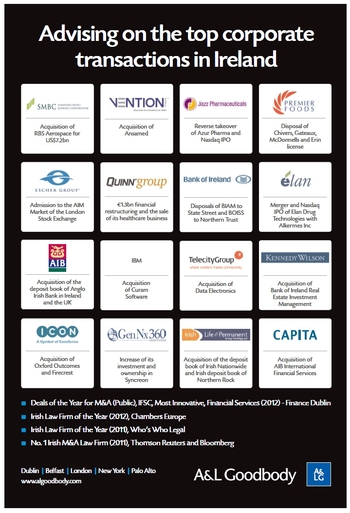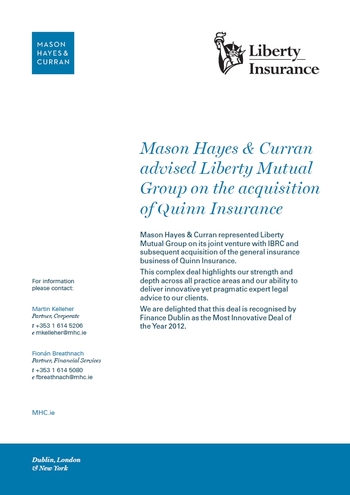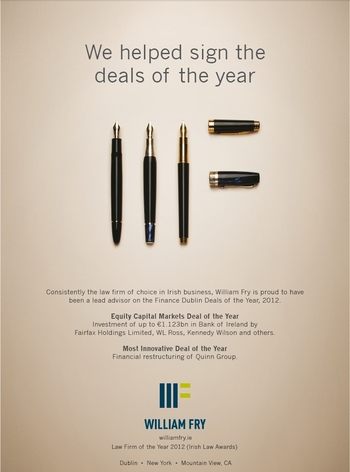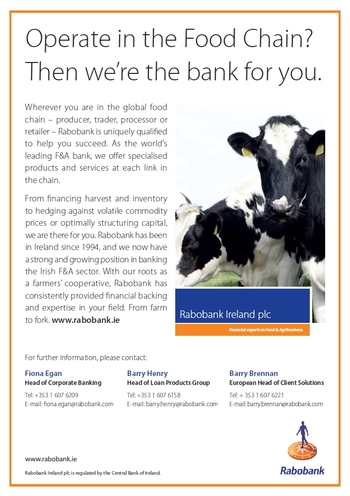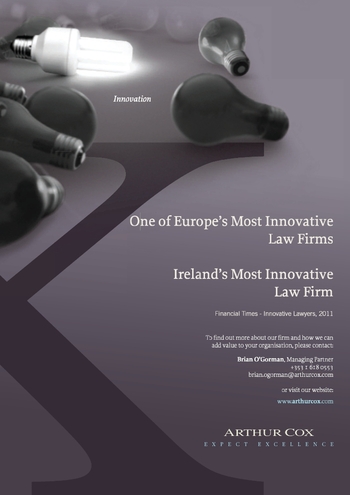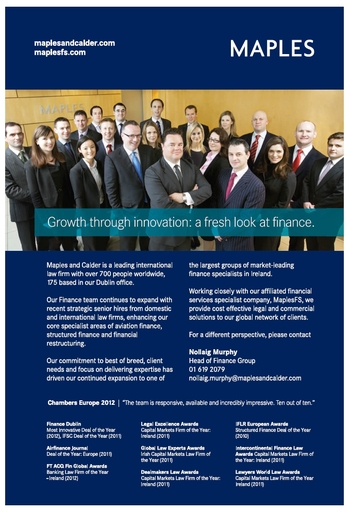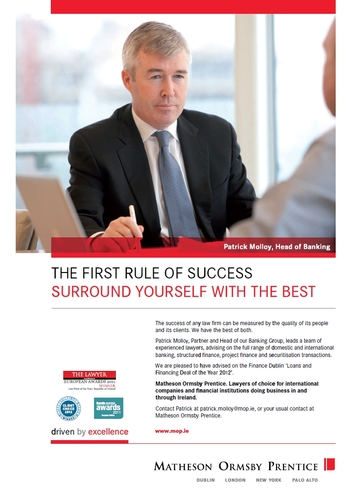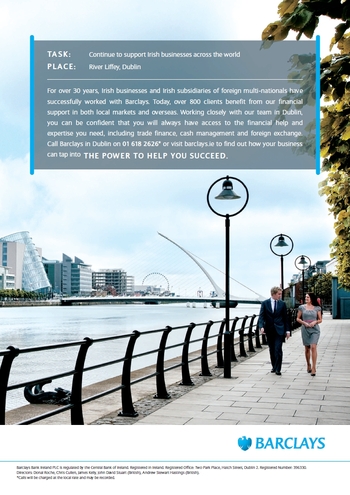Alkermes deal paves path for future US/Irish mergers
The deal structure provides a model for US corporations looking to effect transformational mergers with Irish companies
Alkermes, Inc acquisition of Elan Drug Technologies (EDT) from Elan Corporation Plc has won the Mergers and Acquisitions Public Deal of the Year. In late 2011 Elan embarked on the cross-jurisdictional de-merger of its $1 billion EDT business; EDT’s merger with Alkermes Inc; and the subsequent IPO of Alkermes plc to create a $2.2 billion Irish headquartered plc, listed on NASDAQ.
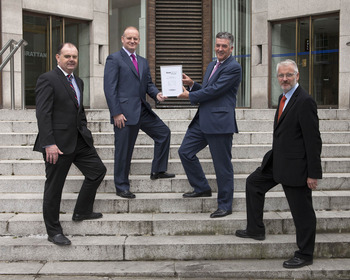
(L-R) Cathal Fitzgerald, finance director, The Irish Dairy Board; Kevin Lane, CEO, IDB; Kevin Knightly, chief executive, Rabobank Ireland; Barry Henry, head of loan products group, Rabobank Ireland. The Irish Dairy Board's 190 million euro supplier financing facility, arranged by Rabobank, won the Loans and Financing Deal of the Year 2012. (click to enlarge)
This was a unique legal and tax structure, to satisfy 'anti-inversion' rules and proved to be a very successful and attractive deal structure to other US Corporations looking to effect a transformational merger with Irish companies. The cross border merger of Elan Drug Technologies with Alkermes Inc. resulted in the creation of a profitable, Irish headquartered, global leader in Central Nervous System medication, Alkermes plc.
'This is a deal that made sense from every standpoint and essentially overnight transformed Alkermes into a profitable growing global biotechnology company. With this merger, Alkermes plc now has some of the most sought-after - but seldom achieved - traits in our industry: revenues from 5 key growing products early in their lifecycles, a productive engine for new drug product candidates and a late-stage pipeline of innovative drug candidates for major diseases. We look forward to the future as we continue to develop important medications to treat central nervous system (CNS) disorders that affect millions of patients,' said Richard Pops, CEO, Alkermes.
‘The merger was an ideal strategic fit at a time when both businesses were strong, and positioned for growth. It brought together two entities with complementary assets to create a global biopharmaceutical innovator with a strong focus in the field of CNS. The pairing of Alkermes and EDT resulted in the emergence of what we believe is one of the most exciting companies in the CNS space today.’
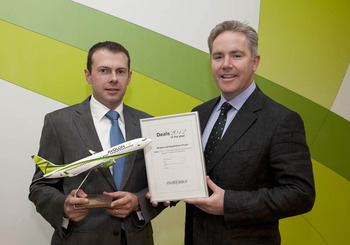
(L-R) Andy Cronin, CFO Avolon and Domhnal Slattery, CEO, Avolon. Avolon won the Mergers and Acquisitions Private Deal of the Year Award 2012. (click to enlarge)
‘As with any deal of this magnitude, there were some inherent obstacles. To help fund the transaction, Alkermes secured $450 million in loans during what was a difficult market environment. The expected strength of the combined company enabled us to do so and on favorable terms. Alkermes also needed to secure shareholder approval of the transaction. Leading up to the shareholder vote last September, we spent a significant amount of time and effort sharing with investors our vision of the combined company. The strategic and complementary nature of the deal was well-received by shareholders and a resounding 99.9 per cent of the votes cast were in favor of the merger,’ said Pops.
‘We were delighted to represent Elan in this pioneering and highly innovative transaction which unlocked significant value for both companies’ said John Given, partner who led the A&L Goodbody team.
‘We are also pleased to have acted on a number of subsequent transactions using similar deal technology to that which we devised with Elan and its advisers on the EDT/Alkermes transaction, and are delighted that a number of other US companies have followed Alkermes' lead in establishing significant operations in Ireland by merging with Irish companies,’ he said.
‘We were delighted to have been involved in such a groundbreaking transaction. From an Elan perspective, the demerger of EDT enabled Elan to become a pure-play neuroscience-based biotechnology company. The structure enabled Elan to achieve an excellent commercial result for the sale of its EDT business," said Cian McCourt head of A&L Goodbody’s New York office.
'The Alkermes deal achieved a number of important objectives. It merged US and Irish pharma businesses, moved IP to Ireland to be developed here and created a new Irish listed company. Imitation is the sincerest form of flattery: the structure has since been repeated,' said Fintan Clancy, partner at Arthur Cox.
The investment in BOI by a group of international investors is a turning point in the narrative on Ireland
The investment in BOI ensures that the Bank of Ireland Group remains a privately held institution. The investment was a vote of confidence in Ireland’s recovery and in the future of its banking system
The investment by Fairfax Holdings Limited and a group of independent international investors of up to €1.123 billion of equity in Bank of Ireland (BoI) has won this year's Equity Capital Markets Deal of the Year.
The Bank of Ireland Group capital requirement under the Central Bank of Ireland 2011 Prudential Capital Adequacy Review (supported by the ECB/EU/IMF) was set at €4.2 billion equity tier 1 capital and €1 billion contingent capital. Given the size of the capital raising, there was a strong market expectation of majority State ownership for Bank of Ireland Group.
The task was to produce a capital raising structure to maximise the potential for private capital involvement, while also largely preserving existing shareholders’ pre-emption rights. The final structure comprised a €2.6 billion liability management exercise, offering certain subordinated bondholders the opportunity to sell their bonds for cash/Bank of Ireland stock, and a rights issue, underwritten by the Irish State, for the balance. Bank of Ireland Group also facilitated a group of US-based institutional investors and fund managers acquiring c. €1.1 billion in Bank of Ireland shares from the State (amounting to a 34.96 per cent stake).
The transaction has very significant positive implications for Ireland. The net impact of these three transactions was to ensure that Bank of Ireland Group remains a privately held institution with the State’s shareholding reduced from 36 per cent to 15 per cent. It was also a significant vote of confidence in Ireland at a difficult time economically. Described by the Minister for Finance Michael Noonan as ‘a key point in changing the narrative on Ireland … and a very significant vote of confidence in the future of the Irish economy”.
This was the first investment in an Irish bank by private institutional investors since 2008 and represents a significant divestment by the Irish State of its majority shareholding. Tax also played a key role for the investor group, the Irish Government and BoI.
'This was a unique opportunity to reprivatise Ireland's largest bank at a price fair to both the new investors and the other stakeholders. Everyone had a preemptive right to buy shares at the same price. Fairfax, WL Ross, Fidelity, Capital Research and Kennedy Wilson took up the unsubscribed shares. This is the first time such a format has been used in a reprivatisation.' said Wilbur Ross speaking exclusively to Finance Dublin.
'It was the first post-economic crisis investment on a material scale in the Irish financial sector and thus gave a boost, not just to the bank, but to the economy as a whole, signaling the belief by hard-headed North American investors in Ireland's recovery potential. Due to the sensitivity and complexity of the deal and its very short timescale - especially for a transaction that was subject to both Takeover Panel and Central Bank scrutiny, it required extraordinary teamwork within law firms, between the firms and their clients, between the various parties and with regulators. The sheer volume of emails per day was phenomenal - and of course, all had to be read, dealt with and responded to. For William Fry's part, the fact that we had multiple clients who had come together for the transaction, all with their own internal procedures and requirements, added significantly to this. Finally, we should add that the Central Bank and Takeover Panel regulators were very supportive and efficient, and their prompt, constructive responses to us were very helpful,' said Owen O'Connell, partner, William Fry.
‘Timing was very short, as the deadline had already been set by external events before terms were agreed, and simply had to be met. This compelled all parties - investors, the State and the bank and all of their internal and external advisers, to be positive, co-operative and pragmatic. They were, and the deal was done on time,' said O'Connell.
'This was a transaction that was undertaken in an environment of rare complexity - its key terms were hammered out in less than a week against the background of the imminent closing of the Bank's rights issue and continuing instability in global capital markets. Striking a balance between the commercial objectives of the parties, and addressing the issues under the Irish Takeover Rules and financial regulations in various jurisdictions, while the deadline for a deal approached was challenging and ultimately, particularly rewarding, as the transaction was viewed as a massive vote of confidence in Ireland's recovery and the first substantial external investment in the Irish banking system since the crisis began,' said Padraig O Riordain, partner, Arthur Cox.
'This was a hugely significant deal both for Bank of Ireland Group and for the Irish State,' said Tom Godfrey, chief executive of IBI Corporate Finance.
'Given the size of the bank’s capital raising required under the Central Bank’s Prudential Capital Adequacy Review, there was a strong market expectation of majority State ownership for Bank of Ireland Group.' said Godfrey.
Quinn €1.2 billion restructuring and sale of general insurance business to Liberty Mutual extremely complex
The restructuring of the Quinn Group was one of the largest and most complex in Irish corporate history
The Most Innovative Deal of the Year has been awarded to the Financial Restructuring of the Quinn Group & Sale of Quinn Insurance Limited (under administration). This multi-faceted deal required groundbreaking advisory skill and innovation which resulted in the most significant restructuring in Ireland and in the sale of the general insurance business of Quinn Insurance Limited (QIL) to a joint venture entity Liberty Mutual Direct Insurance Company Limited (owned 51 per cent by US insurance firm Liberty Mutual and 49 per cent by IBRC, (formerly Anglo Irish Bank), and QIL).
In terms of the restructuring, €1.2 billion in debt needed to be restructured. It was a highly complex deal and took almost 2 years to complete. It included numerous international advisors and involved a group containing over 80 subsidiaries in multiple jurisdictions and including a number of regulated entities.
'The transaction involved large teams from our Dublin and Belfast offices and it proved to be one of the most challenging corporate and financial restructurings we have advised on. A number of related transactions had to be carefully coordinated, including two formal court processes, a Company Voluntary Arrangement before the High Court of Northern Ireland [pursuant to which the manufacturing companies within the Quinn group were relieved of more than €800 million of debt] and a scheme before the High Court in Ireland to effect the sale by the administrators of Quinn Insurance Limited. We hope that it will safeguard significant employment within the industrial and manufacturing sectors in Ireland and Northern Ireland.’ said Mark Saunders, partner, Arthur Cox.
‘This was the most significant restructuring transaction in Ireland in 2011. We advised Quinn Group on all aspects of its €1.2bn financial restructuring. The financial restructuring (and parallel corporate restructuring) required advice across the full legal spectrum, including corporate, restructuring, banking, litigation, regulatory & compliance, insurance, competition, employment and property and the involvement of numerous international advisors,’ said David Baxter, partner at A&L Goodbody.
‘A substantial challenge in this transaction was the large number of stakeholders involved and the ever changing composition of the creditor pool. An innovative Northern Irish Company Voluntary Arrangement was used to implement the financial restructuring which in terms of its size and design was the first of its kind in Northern Ireland. This restructuring was highly complex, spanned a number of European and international jurisdictions and took almost 2 years to plan and successfully complete,’ said Michael Neill, partner at A&L Goodbody.
'The deal allowed Liberty Mutual to acquire an established general insurance business in Ireland. Liberty Mutual is experienced in turning around troubled insurance businesses. The alternative to the Liberty Mutual acquisition was the wind down of the business, the loss of 1,500 jobs and a significantly increased call on the Insurance Compensation Fund.' said Martin Kelleher, partner, corporate, Mason Hayes & Curran.
'The transaction was negotiated, signed and competed during a period of unprecedented volatility in Ireland, including the IMF bail-out and the change of Government. It is a testament to Liberty Mutual's commitment to its recently acquired Irish business, both employees and policyholders, that it worked steadfastly during this period to surmount all obstacles to complete the deal,' said Kelleher.
'The deal was unique because of its complexity and the numerous external factors which impacted upon the transaction. Apart from the usual challenge of negotiating an agreement between a buyer and seller, this deal involved Central Bank approval (to set up a new insurance company), High Court approvals (Scheme of Arrangement and Insurance Compensation Fund), EU approvals (State Aid and Merger), and bank & bondholder approvals. Add to the mix, the restructuring of Anglo Irish Bank, the IMF bail-out, the change of Government, and you begin to see the unprecedented volatility which impacted on the deal. We worked steadfastly with Liberty throughout this period to come up with solutions to all obstacles and ensure a successful completion,' he said.
‘The combined value of the note holders and bank syndicate debt amounted to €1.2bn, making it one of the largest ever debt restructurings in Irish corporate history. It was without doubt one of the most complex Irish corporate restructurings, incorporating multi-jurisdictional insolvency analysis, an insurance administration and disposal within the group midway, and implementation of a large-scale share receivership as an enforcement mechanism,’ said Nollaig Murphy partner Maples and Calder.
'Timing was an important factor as there had been uncertainty for some time in relation to the prospect of a successful financial restructuring,' said Elaine Hanly, partner, William Fry.
$300 million investment in Avolon by Singapore’s sovereign wealth fund a big endorsement for the firm and the IFSC
The successful equity raising allows Avolon to meet its equity targets to facilitate the expansion of its fleet size to 150 aircraft by 2015
In October 2011 Avolon the Dublin headquartered aircraft leasing company raised US$300m equity investment by the sovereign wealth fund, The Government of Singapore Investment Corporation(GIC). The raising is the second major equity raise by Avolon since the firm launched in 2010. This investment by the GIC has won the Mergers and Acquisitions Private Deal of the Year Award. This category is made up of firms that are not publicly limited companies.
The successful equity raising is the third by the company since it set up and is a big endorsement of Avolon by a major Sovereign Wealth Fund. The deal gave Avolon a local investor for an important market for the company in the Asia-Pacific region. Avolon anticipates that 50 per cent of its fleet will be placed there within two-three years. The deal realised enough of an equity capital raising for it to reach its target for 2014 with a fleet size of c. 150 aircraft.
'Securing Avolon's third round equity investment from GIC, one of the leading investors in the world with a strong track record of successful investment, marked a strategic milestone in Avolon's development. It endorses our business model, growth prospects, the acumen and experience of our management team and, finally, the ability of our business to deliver superior risk-adjusted returns,' said Domhnal Slattery, CEO of Avolon.
'From a strategic perspective, we wanted to find a top-tier 'local' investor at the heart of our most rapidly growing market, Asia-Pacific. Winning an investment from an investor of GIC's standing substantially raises our profile and enhances our credibility in this market,' he said.
'The equity raise was the result of a private placement process conducted over the summer of 2011 and was particularly significant in that despite the market volatility investors were attracted to the stable profitability of the business combined with the long term fundamentals of the sector.'
'Together with our financial advisors, Citi, we conducted a competitive process globally to raise up to US$300mn of equity capital and were greatly encouraged by the level of interest from a broad range of potential investors. The process culminated in October 2011 when we welcomed GIC as a significant shareholder, taking all of the available equity allocation and adding geographic diversity to our ownership structure,' said Andy Cronin, CFO of Avolon.
‘This significant equity fund raise bring the total capital raised by Avolon to US$4bn which includes US$1.4bn in equity capital. This is one of the largest capital raises by an Irish business,’ said Maples and Calder who worked on the deal.
‘Strengthening and geographically diversifying Avolon’s capital base through a world class equity capital partner in Asia Pacific, advances Avolon’s objective to be the aircraft lessor of choice for airlines in the Asia Pacific region,’ said the firm.
Deal comes with big opportunities looming for the Irish dairy sector with EU milk quotas ending in 2015
The transaction is a first of its kind in Ireland
The winner of this year's Loans and Financing Deal of the Year is a €190 million three-year supplier financing facility arranged by Rabobank Ireland for the Irish Dairy Board (IDB). This facility in addition to extra funding resulted in a total financing package of approximately €350 million for the IDB. The deal comes at the brink of a period of huge opportunity for the Irish dairy industry in light of the anticipated sector growth following the removal of milk quotas in 2015.
The €190 million funding structure is the first of its kind in Ireland and involves a series of ten parallel trade receivables purchase transactions with ten of IDB’s supplier members and as the deal involved a large number of parties it would have required a more than usually complex negotiation process. It is the first deal of its type in Ireland to be syndicated on a funded basis to an international banking group.
Speaking to Finance Dublin, Kevin Lane, the CEO of the Irish Dairy Board said, 'The supplier financing facility gives our members, the Dairy co-ops located throughout Ireland, security of funding for part of their working capital requirements through a dedicated three year €190 mn facility. They access these funds directly from a very strong banking syndicate led by Rabobank in place of an uncommitted facility they previously had directly from the Irish Dairy Board. In addition, this €190 million was an increase of €50 million on the previous fund available to the members of IDB for working capital.'
'IDB were pleased to complete the deal in such a difficult market with a strong panel of banks giving a major boost to IDB and the Irish dairy sector at a time when it is gearing up for the first major expansion in over thirty years when quotas are set to be abolished post 2015,' said Lane.
'This transaction is an innovative structure for funding the Irish dairy industry. It provides a new solution for funding IDB that is at the centre of the dairy industry in Ireland, and further cements Rabobank’s position as a key funder and solutions provider in that sector. The deal transforms IDB from a banker to its cooperative owners into a facilitator and allows for the separation of IDB’s working capital and structural financing,' said Kevin Knightly, the chief executive of Rabobank Ireland.
'It is the first syndicated supplier financing facility in the Irish market and has been tailored to meet the specific business requirements of the members of IDB by providing certainty of working capital funding. This is critical in a market that experiences significant price and currency volatility which would otherwise have the effect of reducing funding availability provided by traditional sources of working capital finance' said Cathal Fitzgerald, finance director at the IDB.
'This facility combined with a €160 mn revolving credit facility to fund IDB's own growth agenda, brings the IDB’s total funding package with this syndicate to €350 mn. This is an increase of €100 mn over the previous facility and on more favourable commercial terms, ' he said.
'The Irish Dairy Board (IDB) reverse invoice discounting (RID) facility involved the close co-operation and agreement of four key players (or groups), namely 1) The IDB, 2) dairy co-op suppliers to the IDB, 3) Rabobank and 4) international banking group. While the transaction was clearly very beneficial to all, the benefits to each party differed slightly,' said Barry Henry, head of loan products group at Rabobank.
'For the IDB the facility enabled the IDB to distinguish its working capital financing needs, which are seasonal and fluctuating, from its longer term structural and development financing needs. The facility also enabled the IDB to focus on, and further grow its core business activities, while also providing adequate working capital to its members,' said Henry.
'The RID provides committed working capital financing to ten of the IDB’s key dairy co-op suppliers. The surety of access to funding from a strong banking group, at a price which reflects the scale and strengths of the IDB as its key trading partner, provides the Irish dairy industry with firm financial foundations upon which it can grow to exploit the opportunities which the removal of the EU quotas in 2015 will present. For the international banking group who participated in the Rabobank led structure, the RID was an opportunity to support an important client in a key Irish industry,' he said.
'The scale of Rabobank’s investment in the IDB financing also evidences the Dutch co-operative’s appetite and ability to support the Irish food and agri industry in a meaningful way,' said Brian Fennelly, manager at Global Client Solutions at Rabobank.
AIB acquisition of EBS a core part of the Government’s two pillar banking strategy
The deal was a key milestone in the restructuring of the Irish banking sector and was a crucial aspect of the bailout agreement with timing a vital element with a Troika deadline of the 31st of July 2011
The demutualisation of EBS Building Society (EBS) and its merger with AIB has won this year's Financial Services Deal of the Year. On 26 May 2011, AIB announced it had signed an agreement to acquire the EBS. Completion of the transaction was an important milestone in the restructuring of the Irish banking sector and followed the announcement by the Minister for Finance on the 31st of March 2011 of the Government’s decision to combine EBS with AIB to form one of the two pillar Irish banks.
Under the terms of the bailout deal agreed with the troika - the European Commission, International Monetary Fund and the European Central Bank - the Irish Government was required to effect fiscal, banking and structural reforms which included the merger of AIB and EBS Building Society.
'Our role in this transaction began with assisting in drafting the legislative amendments to the Irish building societies legislation to facilitate the demutualisation of EBS, which were essential to enable the completion of the transaction in a short time-scale following the Minister for Finance's announcement on the 31st of March 2011 that the combined AIB and EBS would form one of Ireland's two 'pillar banks'. Completion of this transaction on time was critical to achieve the recapitalisation of the combined entity ahead of the Troika's 31st of July deadline for the reorganisation and recapitalisation of the Irish banking sector, so a solutions-focused approach to achieving our client's objectives was essential.’
‘We advised EBS Building Society on its merger with Allied Irish Banks plc to create one of the two Irish “pillar banks”. This transaction was the only time that an “acquisition conversion scheme” has been successfully completed under the Building Societies Acts. The deal was was also unique in that it was the first time that Irish competition clearance was obtained without approval being issued by the Irish Competition Authority (through utilising the Credit Institutions (Financial Support) Act 2008),’ said Peter Murray partner at A&L Goodbody.
‘This complex transaction was a key milestone in the restructuring of the Irish banking sector and was completed within a particularly challenging timeframe,’ said Alan Doherty, managing director of AIB Corporate Finance.
‘The deal was effected by way of an acquisition conversion scheme. This infrequently used mechanism involved the demutualisation of EBS by conversion from a building society to a private limited company which was acquired by AIB,’ he said.
The merged entity was subsequently recapitalised in the amount of €14,800 million. This is the largest capital-raising ever undertaken by an Irish company.
Amongst other matters, the recapitalisation comprised a placing of ordinary shares to the Irish State in the amount of €5 billion. These ordinary shares are listed on the Enterprise Securities Market of the Irish Stock Exchange. The recapitalisation also involved an issue of contingent capital instruments by AIB to the Minister in the amount of €1,600 million, which are listed on the Official List of the Irish Stock Exchange and trading on the Global Exchange Market. The contingent capital instruments are convertible into ordinary shares in specified capital deficiency and/or non-viability events. Both of these transactions completed on 27 July 2011.
In addition, a capital contribution was made to AIB by each of the Minister and the NPRFC in the aggregate amount of €6,050 million on 28 July 2011.
Glanbia issuance was the largest private placement in 2011
The issuance was one of the few Irish corporate capital markets transactions of 2011
Glanbia's issuance of $325 million ten year notes has won the Deal of the Year in the Debt Securities Notes category. On the 15th of June 2011 Glanbia issued $325 million ten year notes, guaranteed by Glanbia plc, on which Barclays acted as joint placement agent with Royal Bank of Scotland. The use of proceeds for this transaction included the refinancing of existing US Dollar debt and for general corporate purposes.
'Given the company decided to move forward with a transaction early in 2011, Barclays was able to get a lot of focus and momentum from investors which helped to book build. Additionally, the fact that the company made themselves available for investor questions during the marketing helped very much in driving home the strengths and merits of the deal,' said Angus Whelchel, managing director at private capital markets in Barclays.
'The company was able to execute at very attractive pricing with a select group of very strong international institutional investors in good size. The transaction also benefited from a delay settlement which helped the company to tailor the drawdown of funds to their specific needs thus helping to mitigate overall financing costs. Lastly the deal provided an efficient outlet for the company to access USD$ and a new investor base which allowed the client to further diversify its investor base while helping to lengthen the maturing profile of the company's debt all at the same time,' said Whelchel.
'The main obstacle that this transaction overcame was in delivering a successful result for Glanbia despite the unprecedented market volatility in Europe. Glanbia did a fantastic job and was very focused on what they wanted to achieve. We were able to allow investors to interact with Glanbia to understand and fully appreciate its geographically diversified business profile and its strong financial position. This strong and open dialogue between Glanbia and investors significantly contributed to the overall success of the deal,' he said.
Northern Trust’s acquisition of BOISS a vote of confidence in the IFSC
The €60 million acquisition allows Northern Trust to enhance its fund service capabilities particularly in areas such as exchange traded funds
The acquisition of Bank of Ireland Securities Services (BOISS) by Northern Trust has won this year's IFSC Deal of the Year. BOISS was sold for a total consideration of up to €60m in an all-cash agreement.
With the closing of this acquisition, Northern Trust expanded its global fund servicing capabilities, particularly in the key areas of fund administration and the support of ETFs. Following the transaction, Northern Trust’s combined assets under custody and administration in Ireland increased by c. €70bn.
‘In 2011, Northern Trust reached an agreement to acquire Bank of Ireland Securities Services Ltd (BoISS), in a deal that would consolidate our position as one of the top providers of fund administration and custody services in Ireland. Northern Trust’s strength, stability and focused business strategy enabled us to react quickly and decisively once the opportunity presented itself,’ said Clive Bellows, country head for Ireland at Northern Trust.
‘Our strategy has always been to acquire for capability. BoISS added significant capabilities to Northern Trust’s product offerings, particularly in the key areas of fund administration and support for exchange traded funds (ETFs),’ Bellows said.
‘BoISS had an impressive client base and a reputation for strong client service, fitting well with Northern Trust’s core values of service, expertise and integrity. This similar culture has meant that integrating BoISS employees into Northern Trust’s existing local management structure has been smooth. Some of the former BoISS staff hold industry positions and are actively involved in the continuing development of the Irish funds industry,’ he said.
‘Our technology expertise has resulted in the smooth conversion of BoISS’ clients onto Northern Trust’s global operating platform - we have already successfully migrated 40 out of 50 clients,’ he said. ‘Ireland is a vital financial centre, and one in which we are actively growing our presence,’ said Bellows.
‘We acted as legal advisers to Bank of Ireland on the sale of its custody and administration business to Northern Trust. This deal formed part of a major strategic disposal programme for the bank and resulted in a highly satisfactory result for all parties. It also represented a significant vote of confidence in the Irish economy, and the Irish funds sector, by an international financial services corporation. We were delighted to be involved in a transaction which reinforced the continued strength of the IFSC,’ said Alan Casey, partner at A&L Goodbody.
‘Ireland is one of the world’s most important domiciles for cross-border fund administration, and we were delighted to act as lead legal advisers to Northern Trust on its acquisition of Bank of Ireland Security Services (BOISS) from Bank of Ireland. This transaction was very complex, given the nature and structure of the target, and had to be effected in a short period, so a considerable amount of work was required of all parties involved to get it done in time. It was also of strategic importance for both buyer and seller. For Bank of Ireland, the sale was consistent with its deleveraging plan for non-core businesses and enabled it to generate further equity tier 1 capital to help meet its recapitalisation requirements. For Northern Trust, by combining the BOISS business with its existing activities in Ireland, the deal allowed it to enhance and expand its global fund service capabilities, and increased Northern Trust's assets under custody and administration in Ireland by approximately €70 billion. As well as being a very positive outcome for the BOISS business and the parties involved, I believe the completion of this acquisition also represented a vote of confidence in Ireland and the financial services industry here by a leading player in the international market,’ said Conor O'Dwyer, partner at Arthur Cox.
‘This was a strategic transaction which enabled both parties to capitalise on key synergies. In addition, not only was it another vote in confidence in Ireland's fund administration industry but it also ensured that Ireland maintained its reputation as a leading domicile for establishing and administering ETFs,’ said Kevin Murphy, partner at Arthur Cox.
‘Having worked previously with BOISS and its management on various strategic projects, IBI Corporate Finance was well-positioned to achieve a timely and very satisfactory outcome for Bank of Ireland Group ... and indeed for Northern Trust,’ said Ger Heffernan, director at IBI Corporate Finance.
‘The profit achieved by Bank of Ireland Group on the sale also meant that the transaction delivered a meaningful equity tier 1 capital contribution of c. €40m to Bank of Ireland and, importantly, this was from market sources’, he said.
‘It was clear from the early stages of the deal that there was an excellent fit between Northern Trust and the BOISS business and significant commitment was demonstrated by both parties and their advisers to deliver on the deal initially struck. BOISS has an excellent track record in the ETF market,’ he said.
Bond issuance gives Northern Ireland Electricity a secure capital base
Last year's winner of the M&A private deal was the acquisition of the Northern Ireland Electricity by ESB, and the NIE has again featured in this year's awards winning the Bonds category for its GBP 400 million bond issuance. This deal was oversubscribed and secured cost effective long term financing ensuring its financial independence.
The winner of this year's Debt Securities Bonds Deal of the Year is the GBP 400 million bond issuance by Northern Ireland Electricity (NIE). NIE, Northern Ireland’s leading electricity distribution company head-quartered in Belfast (and wholly owned subsidiary of ESB), successfully issued a sterling bond on Friday May the 27th 2011, a 15 year senior unsecured bond. NIE priced the GBP 400m transaction with a coupon of 6.375 per cent at a spread of G+250 bps with a Regulatory Asset Base (RAB) of GBP 1.1bn, it was a key financing for the company, in order to secure cost-effective, long-term capital and assure its financial independence.
The issuance resulted in a successful outcome with the final order book consisting of high quality UK based insurance companies and asset managers of a ‘buy and hold’ nature. Unsurprisingly for this tenor, the book was dominated by domestic UK accounts Although this was not a debut transaction, this was a successful reintroduction of the NIE credit and it had an over-subscribed order book.
'The GBP 400 million bond gives NIE a long term secure capital base which will support the funding of its ongoing programme of investment in the electricity transmission and distribution networks in Northern Ireland. The bond enabled NIE to successfully restructure the capital base of the company and better align the repayment profile of the company's debt with the long term nature of NIE's investments. The proceeds of the bond were used to replace short term variable debt with longer term debt repayable in 2026 and provide facilities to meet increasing investments in the coming years to replace ageing assets and to meet government energy policy objectives in relation to the connection of renewable generation. The successful issue of the bond reflects positively on the company's strong performance over many years and its capability to deliver the infrastructure needs for Northern Ireland into the future,' said Mary Collins, finance director of the NIE.
'The GBP 400m Bond issued by NIE was a very significant transaction for ESB Group, following the acquisition of NIE in December 2010. The bond allowed ESB to put an appropriate capital structure in place in NIE to sustain it going forward. The execution of the bond was managed jointly by NIE and ESB Treasury in what was a very successful collaborative effort. It was part of an overall funding programme of over €1.3 billion which was completed by ESB Group in 2011,' said Paul Stapleton, group treasurer at ESB.
'We were enormously pleased to work on this transaction for NIE. For the issuer, it represented long-dated financing at historically attractive yields and for investors, NIE was an attractive opportunity to invest in a rock-solid utility credit with considerable rarity value in the capital markets. Congratulations to the company for an excellent roadshow that sold the story very effectively,' said Murray Black, head of UK & Ireland debt capital markets at BNP Paribas.
High quality investor orders followed a three day roadshow earlier in the week with NIE pricing a GBP 400m transaction with a coupon of 6.375 per cent at a spread of G+250 bps.
Investors had to understand the similarities and differences to other UK electricity distribution companies and become comfortable with the strategy of ESB.
Orderbooks opened at 08:45 GMT with official guidance at G+240-250bps against the 5.000 per cent March 2025 gilt. Several large investors came into the book at an early stage and acted as anchors for the transaction.
Despite a nervous market backdrop, positive feedback from the roadshow was received and on Friday 27th of May 2011 after a go/no-go call at 08:30 GMT, NIE entered the market with a GBP 400m transaction.
Northern Ireland Electricity is responsible for the planning, development, construction and maintenance of the transmission and distribution network, and for the operation of the distribution network in Northern Ireland. The electricity grid comprises a number of interconnected networks of overhead line and underground cables, which are used for the transfer of electricity to customers via a number of substations. There are currently over 800,000 customers connected to the distribution system.
The acquisition of NIE by ESB featured in last year’s awards winning the Mergers & Acquisitions Private Deal. The deal was significant in that it resulted in the consolidation of the entire electricity transmission and distribution network on the island of Ireland into a single entity serving the all-island Single Electricity Market established in November 2007. As a consequence this gave rise to many complex regulatory and competition issues. The timing of the deal is also another significant achievement with the financing for the deal being secured only weeks before the State received the EU/ECB/IMF financing package.
Speaking with Finance Dublin at the time Padraig McManus, CEO of ESB said, ‘The acquisition of NIE demonstrates ESB's continued ambition to grow our business in the rapidly changing energy sector. NIE is a well-run, efficient and profitable business and will continue to operate on that basis. ESB is fully committed to delivering the investment in Ireland's transmission and distribution networks that will be required to deliver our common energy sustainability policy objectives over the coming years.’

